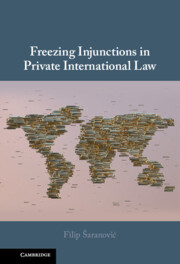Book contents
- Freezing Injunctions in Private International Law
- Freezing Injunctions in Private International Law
- Copyright page
- Contents
- Acknowledgements
- 1 Introduction
- 2 Historical Foundations of Freezing Injunctions
- 3 Theoretical Foundations of Freezing Injunctions
- 4 Theoretical Foundations of Jurisdiction in Private International Law
- 5 Application of Jurisdictional Theories
- 6 Reform Proposals
- 7 The Relationship between Freezing Injunctions and Other Interim Relief
- 8 Conclusions
- Index
6 - Reform Proposals
Published online by Cambridge University Press: 20 October 2022
- Freezing Injunctions in Private International Law
- Freezing Injunctions in Private International Law
- Copyright page
- Contents
- Acknowledgements
- 1 Introduction
- 2 Historical Foundations of Freezing Injunctions
- 3 Theoretical Foundations of Freezing Injunctions
- 4 Theoretical Foundations of Jurisdiction in Private International Law
- 5 Application of Jurisdictional Theories
- 6 Reform Proposals
- 7 The Relationship between Freezing Injunctions and Other Interim Relief
- 8 Conclusions
- Index
Summary
This chapter considers the following two questions about the future of freezing injunctions. First, what changes should be made to the jurisdictional preconditions of freezing injunctions in order to effectively fulfil the international function of the rules of jurisdiction? Second, by what means and on what basis should we allocate regulatory authority in this field? A ‘bold proposal’ for an international agreement is considered. While that would be the ideal solution in this field, some modest solutions are then proposed. Modest solutions rely on the implementation of changes only at the domestic level. The counter-arguments to the proposals based on functional theories of jurisdiction are also considered. The functional theories are heavily dependent on the principle of territoriality. The role of the doctrine of forum non conveniens is discussed in the context of modest proposals.
Keywords
- Type
- Chapter
- Information
- Freezing Injunctions in Private International Law , pp. 178 - 217Publisher: Cambridge University PressPrint publication year: 2022

